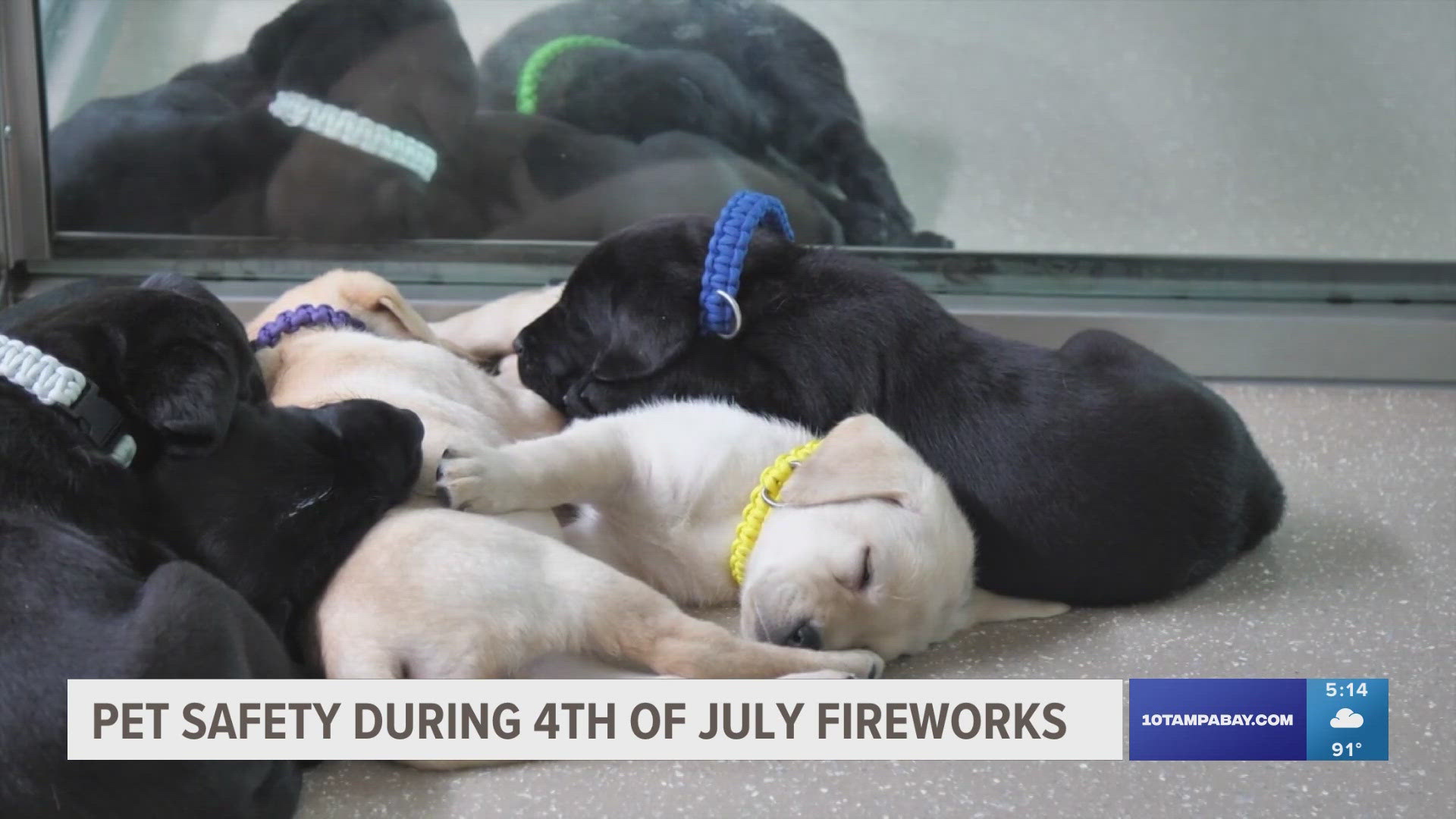ST. PETERSBURG, Fla. — While people find fireworks on the 4th of July exciting, pets usually don't. Here are some ways to calm your pets to keep them safe and some preventative measures in case the worst happens.
How to calm dogs during fireworks
With dogs, planning ahead is critical, according to the Royal Society for the Prevention of Cruelty to Animals (RSPCA).
Days before the fireworks
The RSPCA recommends that dog owners provide their dogs with a "doggy safe haven." Choose one of the quietest rooms in your home, likely one with no or minimal windows.
Train your dog to associate the area with positive experiences by:
- Leave their favorite toys in the area, including stuffed Kongs and chews
- Swap toys regularly to avoid boredom
- Don't interfere with the space when the dog is in there
- Lay their favorite blankets, beds and other positive associations the dog already has
- Freeze bone broth in ice cube trays as a treat to distract them
Doing this a few days before the fireworks is critical to ensuring the dog feels secure, according to the RSPCA. The organization also recommends moving your dog to the haven each evening before the fireworks begin.
Day of fireworks
- Walk your dog during daylight, before fireworks begin, to avoid walks during the fireworks.
- Put things in the haven room that you can do so your dog isn't left alone.
- Close windows and curtains to muffle the sound of fireworks and blackout the haven so they can't see any flashes.
- Put on white noise, music or TV shows to mask the firework sounds further.
- Ignore the fireworks yourself so your dog doesn't suspect anything is happening.
- Play with toys with your dog to see if they want to join in, but don't force the toys or physical touch on them.
- Use soothing tones and slowly pet and comfort them if they allow you to.
- Your vet might prescribe medication for your dog if they are too reactionary.
How to calm your cat during fireworks
Cats have very sensitive hearing, so fireworks may not be their cup of tea.
Days before fireworks
Similar to dogs, cats need a haven or space to retreat to feel more in control or comfortable, according to Cats Protection. Put your cat's favorite toys, blankets and towers into their favorite room, but do not confine them to one room as that may make them feel trapped and stress out more.
Ensure your cat's microchip details are updated online so you are easily reachable if they do get out.
Day of fireworks
- Staying home with your cat may make them feel more settled and safe. If you do leave, make sure they have a safe and comfortable space to relax.
- Close all windows and areas of outside access. Your cat may be skittish, making it difficult to catch them if they try to run out of the house in fear.
- Close the curtains around the house to shield your cat from the flashes and reduce your cat's anxiety.
- Keep white noise, the radio or TV on to distract from loud noises and reduce the impact of sudden sounds from fireworks. Studies show cats find classical music particularly calming.
- Buy them a catnip toy or treat to distract them. Catnip also has calming or distracting effects on cats.
- Vets may prescribe a calming or sedative medication if your cat is increasingly stressed during fireworks.
Similar measures can be taken for birds and reptiles. The most important part of keeping pets safe and comfortable is restricting the pet from the outside by closing windows and doors and keeping the in-and-out movement from your house minimal.
Preventative measures
The American Kennel Club cites Independence Day as one of the most prevalent times for pets to run away, mainly when home celebrations occur and doors regularly open and close. Here are some preventative measures to take if you're worried your pet may run away.
- Make sure your pet is microchipped and registered with your vet. Registering the microchip online also allows you to enter the pet's emergency contacts and personal information.
- Ensure your pet has a collar with your identification information, including your name, phone number and address.
- Have an up-to-date picture of your pet, including images of marks that may better identify them.
- Add a GPS device to your pet's collar. GPS tracking ID tags are available at most pet stores that have their location in real-time, but other options like Tile for pets and Apple AirTag collars also exist.

